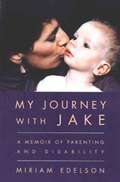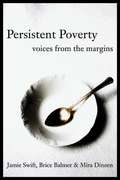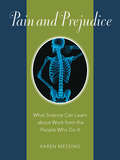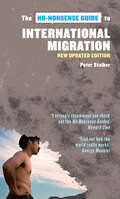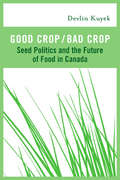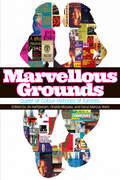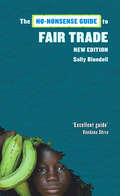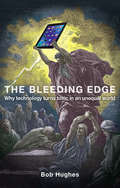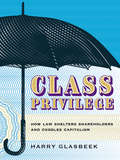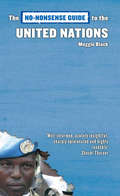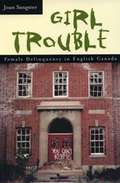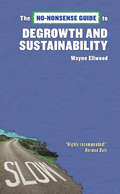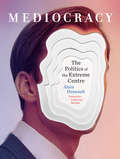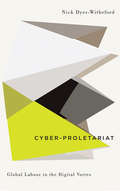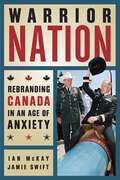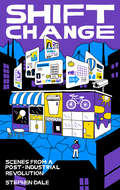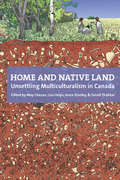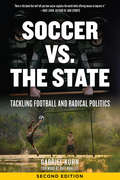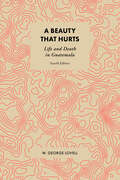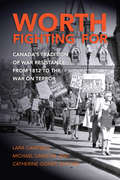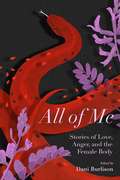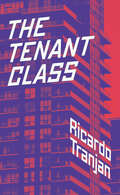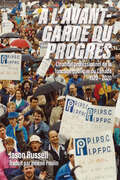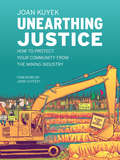- Table View
- List View
My Journey with Jake: A Memoir of Parenting and Disability
by Miriam EdelsonJake is celebrating his tenth birthday. That’s a remarkable feat, because at birth he was given only three years to live. Miriam Edelson is his mother, a dedicated fighter for Jake and families in similar situations. Edelson poses some tough questions: How do parents cope with a child who has special needs? Are we failing, as a society, to care for children with disabilities? Whatever happened to the federal government’s promise of a “Children’s Agenda”? My Journey with Jake works on two levels. It’s a poignant memoir by a devoted mother, and a hard-hitting, well-researched look at health care for Canada’s children.
Persistent Poverty: Voices From the Margins
by Brice Balmer Mira Dineen Jamie SwiftIt’s a very short trip from the limousine seat to the curb. Jim Mann never missed a payroll for the dozen men who worked for his flourishing landscaping business he built from the ground up. Now he lives hand-to-mouth. His pockets are empty long before his next social assistance cheque arrives. In early 2010 over two hundred civic and faith leaders fanned out into thirty Ontario communities. Their goal? To explore how the least fortunate people in one of the world’s richest places are faring. The Interfaith Social Assistance Reform Coalition’s latest social audit exposed a tattered social assistance system run by volunteers desperately struggling to fill the gaps. There can be no papering over the savage inequalities and suffering exposed in this compelling look at life from the margins.
Pain and Prejudice: What Science Can Learn About Work From The People Who Do It
by Dr Karen MessingIn 1978, when workers at a nearby phosphate refinery learned that the ore they processed was contaminated with radioactive dust, Karen Messing, then a new professor of molecular genetics, was called in to help. Unsure of what to do with her discovery that exposure to the radiation was harming the workers and their families, Messing contacted senior colleagues but they wouldn’t help. Neither the refinery company nor the scientific community was interested in the scary results of her chromosome studies. Over the next decades Messing encountered many more cases of workers around the world—factory workers, cleaners, checkout clerks, bank tellers, food servers, nurses, teachers—suffering and in pain without any help from the very scientists and occupational health experts whose work was supposed to make their lives easier. Arguing that rules for scientific practice can make it hard to see what really makes workers sick, in Pain and Prejudice Messing tells the story of how she went from looking at test tubes to listening to workers.
No-Nonsense Guide to International Migration (No-Nonsense Guides #18)
by Peter StalkerVirtually any commodity can move around the world to satisfy demand, but human beings have far less freedom. Many would-be migrants are forced to risk life and limb traveling illegally. Yet most rich countries are short of workers, have shrinking populations, and need more immigrants. The No-Nonsense Guide to International Migration is a timely primer to a major issue that is never far from the headlines.
Good Crop / Bad Crop: Seed Politics and the Future of Food in Canada
by Devlin KuyekIN RECENT YEARS Canadians have become more and more concerned about the origins oftheir food and the environmental impacts of pesticides in agriculture. What is less well knownis that pesticide corporations such as Monsanto and Du Pont have bought their way into the seed industry and are taking control of what was once the exclusive domain of farmers.In Good Crop / Bad Crop, Devlin Kuyek deftly examines the economic and environmental background of the modern seed trade from a Canadian perspective. Historically seeds were viewed more as public goods than as commodities, and plant breeding objectives were widely shared by scientists, governments, and farmers. Now that approach is changing; seeds have become increasingly commodified, and plant breeding has become subject to corporate priorities. Farmers and citizens in Canada, Kuyek points out, need to heed the hard-won lessons from the developing world, where farmers greatly damaged by the much-heralded approaches of theGreen Revolution are now taking steps to reclaim control over seed supplies, food security, and their futures.
Marvellous Grounds: Queer of Colour Histories of Toronto
by Jin Haritaworn, Ghaida Moussa, and Syrus Marcus WareToronto has long been a place that people of colour move to in order to join queer of colour communities. Yet the city’s rich history of activism by queer and trans people who are Black, Indigenous, or of colour (QTBIPOC) remains largely unwritten and unarchived. While QTBIPOC have a long and visible presence in the city, they always appear as newcomers in queer urban maps and archives in which white queers appear as the only historical subjects imaginable. The first collection of its kind to feature the art, activism, and writings of QTBIPOC in Toronto, Marvellous Grounds tells the stories that have shaped Toronto’s landscape but are frequently forgotten or erased. Responding to an unmistakable desire in QTBIPOC communities for history and lineage, this rich volume allows us to imagine new ancestors and new futures.
No-Nonsense Guide to Fair Trade (No-Nonsense Guides #7)
by Sally BlundellAn in-depth look at two decades of a movement that aims to challenge the ethical foundations of the global market. Transnational corporations look for the cheapest suppliers, while the fair trade movement insists on a premium for the producers at the start of the chain. Sally Blundell explores the origins of fair trade and what it is likely to become in the face of growing disparities between the principles and the practice.
The Bleeding Edge: Why Technology Turns Toxic in an Unequal World
by Bob HughesIt’s hammered into us from birth that ‘all good things come at a price’. Today, that price looks apocalyptic, with wars, exploitation and environmental collapse in every part of the globe. Some suggest that the carnage is “a price worth paying” for technological progress. No pain, no gain. But technology is precisely the business of minimising the costs and impacts of existence… and by whole orders of magnitude. By now, all human beings should be leading creative, leisure-filled lives in a pristine world of burgeoning diversity. So how did it go so wrong? In a word, inequality. In The Bleeding Edge, Bob Hughes argues that unequal societies are incapable of using new technologies well. Wherever elites exist, self-preservation decrees that they must take control of new technologies to protect and entrench their status, rather than satisfy people’s needs. Hughes pursues the latest discoveries about the effects of social inequality on human health, into the field of human environmental impact, and traces today’s ecological crisis back to the rise of the world’s first elites, 5,000 years ago. He argues that new technologies have never emerged from elites or from the clash of competitive forces, but from largely voluntary, egalitarian collaborations of the kind that produced the world’s first working computers. Finally, Hughes shows that an egalitarian world is not ‘pie in the sky' but our evolutionary homeland, the glue that holds societies together, and the “cradle of invention” from which all our best ideas emerge. The book concludes: ‘Let’s assume that the commitment to human equality that’s written into the Universal Declaration of Human Rights means exactly what it says, and take it from there.’
Class Privilege: How Law Shelters Shareholders and Coddles Capitalism
by Harry GlasbeekCapitalism’s agenda is the endless pursuit of private accumulation of socially produced wealth. In our system, the corporation—created by law—is meant to hide this agenda, to distract us so that flesh and blood capitalists can do what they like. But when the workings of the corporation are examined, they reveal a betrayal of the very values and norms that, for their legitimacy’s sake, capitalists in our parts of the world purport to share. Harry Glasbeek highlights one of capitalism’s weak spots–the perverting economic, political, and ethical roles played by the prime instrument of private wealth accumulation: the legal corporation. Once the corporate mask is ripped off, those who hide behind it become visible. Stripped of their protective garb, the capitalist class will be just as naked as the rest of us are when we face their corporations.
No-Nonsense Guide to the United Nations (No-Nonsense Guides #24)
by Maggie BlackIn the first book to distill the entire history of the United Nations into one accessible volume, Maggie Black explains how this complex organization works. In doing so, she explores its successes, failings, and limitations. This No-Nonsense Guide addresses the U.N.’s creation and early history, how it is structured, and whether it can effectively fulfill its mandate. The author considers possibilities for reform to make it more democratic and efficient.
Girl Trouble: Female Delinquency in English Canada
by Joan SangsterRarely a week goes by when juvenile delinquency or the Young Offenders Act are not discussed in the dominant media. Are we witnessing a moral panic over youth crime or a spate of “child-blaming” driven by the politics of law and order? Sangster traces the history of young women and crime and in so doing punctures dozens of myths surrounding these issues. Girl Trouble uncovers the voices of girls and their families who are caught up in the juvenile justice system, and provides a critical look at the definitions of, and solutions to, female delinquency. The book fills a significant gap in Canadian social and legal history.
No-Nonsense Guide to Degrowth and Sustainability
by Wayne EllwoodThe world’s addiction to economic growth continues with barely any recognition that this is a problem. Indeed, in a Western world currently dominated by austerity measures and ducking in and out of recession, growth is seen even by progressives as the only possible solution for our economic and social woes. This No-Nonsense Guide looks deeper into the idea of economic growth–to trace its history and understand why it has become so unchallengeable and powerful. And then it goes beyond that to present the alternative–how we can kick our dirty habit, how degrowth can be turned into a positive and how we can arrive at a new levels of environmental sustainability without having to turn the clock back to the Dark Ages.
Mediocracy: The Politics of the Extreme Centre
by Alain DeneaultThere was no Reichstag fire. No storming of the Bastille. No mutiny on the Aurora. Instead, the mediocre have seized power without firing a single shot. They rose to power on the tide of an economy where workers produce assembly-line meals without knowing how to cook at home, give customers instructions over the phone that they themselves don’t understand, or sell books and newspapers that they never read. Canadian intellectual juggernaut Alain Deneault has taken on all kinds of evildoers: mining companies, tax-dodgers, and corporate criminals. Now he takes on the most menacing threat of all: the mediocre.
Cyber-Proletariat: Global Labour in the Digital Vortex
by Nick Dyer-WithefordThe utopian promise of the internet, much talked about even a few years ago, has given way to brutal realities: coltan mines in the Congo, electronics factories in China, devastated neighborhoods in Detroit. Cyber-Proletariat shows us the dark-side of the information revolution through an unsparing analysis of class power and computerization. Dyer-Witheford investigates how technology facilitates growing polarization between wealthy elites and precarious workers. He reveals the class domination behind everything from expanding online surveillance to intensifying robotization. At the same time, he looks at possibilities for information technology within radical movements.
Warrior Nation: Rebranding Canada in an Age of Anxiety
by Ian McKay Jamie SwiftOnce known for peacekeeping, Canada is becoming a militarized nation whose apostles—-the New Warriors-—are fighting to shift public opinion. New Warrior zealots seek to transform postwar Canada’s central myth-symbols. Peaceable kingdom. Just society. Multicultural tolerance. Reasoned public debate. Their replacements? A warrior nation. Authoritarian leadership. Permanent political polarization. The tales cast a vivid light on a story that is crucial to Canada’s future; yet they are also compelling history. Swashbuckling marauder William Stairs, the Royal Military College graduate who helped make the Congo safe for European pillage. Vimy Ridge veteran and Second World War general Tommy Burns, leader of the UN’s first big peacekeeping operation, a soldier who would come to call imperialism the monster of the age. Governor General John Buchan, a concentration camp developer and race theorist who is exalted in the Harper government’s new Citizenship Guide. And that uniquely Canadian paradox, Lester Pearson. Warrior Nation is an essential read for those concerned by the relentless effort to conscript Canadian history.
Shift Change: Scenes from a Post-industrial Revolution
by Stephen DaleHamilton’s industrial age is over. In the steel capital of Canada, there are no more skies lit red by foundries at sunset, no more traffic jams at shift change. Instead, an urban renaissance is taking shape. But who wins and who loses in the city’s not-too-distant future? Is it possible to lift a downtrodden, post-industrial city out of poverty in a way that benefits people across the social spectrum, not just a wealthy elite? In Shift Change, author Stephen Dale sets up “the Hammer” as a battlefield, a laboratory, a chessboard. As investors cash in on a real estate gold rush and the all-too-familiar wheels of gentrification begin to turn, there’s still a rare opportunity for both old-guard and newcomer Hamiltonians to come together and write a different story—one in which Steeltown becomes an economically diverse and inclusive urban centre for all. What plays out in these pages and at this very moment is a real-time case study that will capture the attention and the imagination of anyone interested in equitable redevelopment, housing activism, and social justice in the North American city.
Home and Native Land: Unsettling Multiculturalism in Canada
by May Chazan, Lisa Helps, Anna Stanley, & Sonali ThakkarHome and Native Land takes its vastly important topic and places it under a new, penetrating light–shifting focus from the present grounds of debate onto a more critical terrain. The book’s articles, by some of the foremost critical thinkers and activists on issues of difference, diversity, and Canadian policy, challenge sedimented thinking on the subject of multiculturalism. Not merely “another book” on race relations, national identity, or the post 9-11 security environment, this collection forges new and innovative connections by examining how multiculturalism relates to issues of migration, security, labour, environment, nature, and land. These novel pairings illustrate the continued power, limitations, and, at times, destructiveness of multiculturalism, both as policy and as discourse.
Half Light
by Frances HegartyThe finest medical gauze, sharp instruments for delicate probing, linseed oil... these were a few of the tools of Elisabeth Young's trade. A restorer of paintings, she delighted in her tasks: to clean, patch, fill in, and revarnish until the work gave up its secrets and glowed in its original glory. Alone in her London flat, Elisabeth savored the tranquility demanded by both her craft and her soul... a gently guarded peace shared solely with her latest lover, Francis Thurloe. Amiable, patrician, unconscious of his assumption that adoration was his birthright, the handsome barrister felt thwarted by Elisabeth's baffling mix of sensual generosity and emotional reserve. She did not confront, demand, or whine... nor did she confide her mounting anxiety over the suspicion that she was being followed wherever she went. And when she accepted an offer to restore a wealthy collector's paintings, stored in his cavernous mansion flat, no one knew that Elisabeth Young was about to disappear... When the police find her car abandoned, and her flat tidy, with trash put out, their interest lapses: woman picked up and left, as single women do... .no family, no close friends, not to worry, she'll turn up. But Francis, worried, begins a search that leads him to Annie Macalpine, an antiques dealer whose spiked-hair, lowbrow stance hides the bravest and hungriest of hearts... Enid Daley, Elisabeth's self-appointed concierge, whose jealousy of her winsome, serene neighbor curdles with venom... Thomas Milton, a patron of the arts whose private demons have forged a brutal sense of entitlement... Maria Milton, his sister, grotesque in form and speech, but solaced by severe religious rituals... Butler, Thomas's companion, ferociously loyal and trained to attack without mercy. As a madman's vise tightens around the trapped Elisabeth, Francis and Annie hunt frantically for his elegant prison, where beautiful works of art are coaxed to life... only to be savagely destroyed... .
Soccer vs. the State: Tackling Football and Radical Politics, Second Edition
by Gabriel KuhnSoccer has turned into a multi-billion-dollar industry. Professionalism and commercialization dominate its global image. Yet the game retains a rebellious side, maybe more so than any other sport co-opted by money makers and corrupt politicians. From its roots in working-class England to political protests by players and fans, and a current radical soccer underground, the notion of football as the “people’s game” has been kept alive by numerous individuals, teams, and communities. This book not only traces this history, but also reflects on common criticisms: soccer ferments nationalism, serves right-wing powers, and fosters competitiveness. Acknowledging these concerns, alternative perspectives on the game are explored, down to practical examples of egalitarian DIY soccer! Soccer vs. the State serves both as an orientation for the politically conscious football supporter and as an inspiration for those who try to pursue the love of the game away from televisions and big stadiums, bringing it to back alleys and muddy pastures. This second edition has been expanded to cover events of recent years, including the involvement of soccer fans in the Middle Eastern uprisings of 2011–2013, the FIFA scandal of 2015, and the 2017 strike by the Danish women’s team.
A Beauty that Hurts: Life and Death in Guatemala
by W. George LovellWhen A Beauty That Hurts first appeared in 1995, Guatemala was one of the world’s most flagrant violators of human rights. An accord brokered by the United Nations brought a measure of peace after three decades of armed conflict, but the country’s troubles are far from over. George Lovell revisits Guatemala to grapple once again with the terror inflicted on its Maya peoples by a military-dominated state.
Worth Fighting For: Canada’s Tradition of War Resistance from 1812 to the War on Terror
by Lara Campbell, Michael Dawson, and Catherine GidneyHistorians, veterans, museums, and public education campaigns have all documented and commemorated the experience of Canadians in times of war. But Canada also has a long, rich, and important historical tradition of resistance to both war and militarization. This collection brings together the work of sixteen scholars on the history of war resistance. Together they explore resistance to specific wars (including the South African War, the First and Second World Wars, and Vietnam), the ideology and nature of resistance (national, ethical, political, spiritual), and organized activism against militarization (such as cadet training, the Cold War, and nuclear arms). As the federal government continues to support the commemoration and celebration of Canada’s participation in past wars, this collection offers a timely response that explores the complexity of Canada’s position in times of war and the role of social movements in challenging the militarization of Canadian society.
All of Me: Stories of Love, Anger, and the Female Body
by Dani BurlissonWith women’s anger, empowerment, and the critical importance of intersectional feminism taking center stage in much of the dialogue happening in feminist spaces right now, an anthology like this has never been more important. The voices in this collection of essays and interviews offer perspectives and experiences that help women find common ground, unity, and allyship. Through personal essays and interviews about what it is like to live as a woman (cis + trans) in this modern world—with all of our love, anger, complexities, and desires for justice—All of Me: Stories of Love, Anger, and the Female Body includes vulnerable, painful truths and bold inspiration. This anthology is for seasoned feminists and young feminists alike—anyone looking to find inspiration in radical activism, creativity, healing, and more. This book covers topics of social and economic justice, creativity, racism, transgender perspectives, sexuality, sex work, addiction and recovery, reproductive rights, assault, relationship dynamics, families, fitting and not fitting in, radical self-care, witchcraft, and more. If love and anger are two sides of the same coin, for women there are worlds to be explored with every flip of that coin. Readers will find a glimpse into those worlds in the pages of All of Me. Contributors include Silvia Federici, Michelle Cruz Gonzales, Ariel Gore, Laurie Penny, Lidia Yuknavitch, Christine No, Kandis Williams, Vatan Doost, Deya, Phoenix LeFae, Anna Silastre, Michel Wing, Bethany Ridenour, Lorelle Saxena, Airial Clark, Patty Stonefish, Nayomi Munaweera, Melissa Madera, Margaret Elysia Garcia, Leilani Clark, Ariel Erskine, Wendy-O Matik, Kara Vernor, Starhawk, adrienne maree brown, Gerri Ravyn Stanfield, Sanam Mahloudji, Melissa Chadburn, Avery Erickson, and Milla Prince.
The Tenant Class
by Ricardo TranjanIn this trailblazing manifesto, political economist Ricardo Tranjan places tenants and landlords on either side of the class divide that splits North American society. What if there is no housing crisis, but instead a housing market working exactly as intended? What if rent hikes and eviction notices aren’t the work of the invisible hand of the market, but of a parasitic elite systematically funneling wealth away from working-class families? With clarity and precision, Tranjan breaks down pervasive myths about renters, mom-and-pop landlords, and housing affordability. In a society where home ownership is seen as the most important hallmark of a successful life, Tranjan refuses to absolve the landlords and governments that reap massive profits from the status quo. The tenant class must face powerful systems of disinformation and exploitation to secure decent homes and fair rent. Drawing upon a long, inspiring history of collective action in Canada, Tranjan argues that organized tenants have the power to fight back.
À L’avant-garde du progrès: L’Institut professionnel de la fonction publique du Canada 1920–2020
by Jason RussellLe 6 février 1920, un petit groupe d’employés de la fonction publique se réunit pour la première fois afin de former une association professionnelle. Un siècle plus tard, l’Institut professionnel de la fonction publique du Canada (IPFPC) est un agent négociateur représentant près de 60 000 travailleurs du secteur public dont les efforts pour le bien collectif améliorent la vie de chaque Canadien. Publié à l’occasion du 100e anniversaire de fondation de l’IPFPC, À l’avant-garde du progrès dresse le portrait complet de son évolution, de 1920 à aujourd’hui, et lève le voile sur un pan souvent négligé de l’histoire syndicale nord-américaine. L’auteur, Jason Russell, s’appuie sur une abondante collection de sources, dont des documents d’archives et des témoignages de dizaines de membres actuels et passés de l’IPFPC. Marquée par des réussites et semée d’embûches, l’histoire est complexe et racontée avec clarté et modération. Après des décennies de changements démographiques et générationnels, de booms et de crises économiques et de bouleversements politiques, les membres de l’IPFPC entament les cent prochaines années guidés par la même mission importante que celle qui les a inspirés jusqu’à présent : militer pour une justice sociale et économique pour le bien de tous les Canadiens et Canadiennes.
Unearthing Justice: How to Protect Your Community from the Mining Industry
by Joan KuyekThe mining industry continues to be at the forefront of colonial dispossession around the world. It controls information about its intrinsic costs and benefits, propagates myths about its contribution to the economy, shapes government policy and regulation, and deals ruthlessly with its opponents. Brimming with case studies, anecdotes, resources, and illustrations, Unearthing Justice exposes the mining process and its externalized impacts on the environment, Indigenous Peoples, communities, workers, and governments. But, most importantly, the book shows how people are fighting back. Whether it is to stop a mine before it starts, to get an abandoned mine cleaned up, to change laws and policy, or to mount a campaign to influence investors, Unearthing Justice is an essential handbook for anyone trying to protect the places and people they love.
